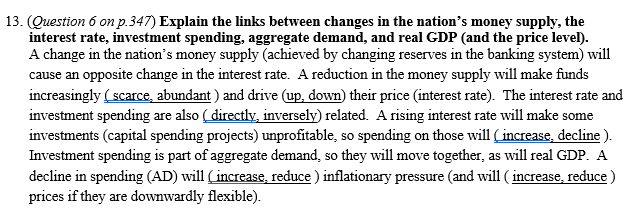13. (Question 6 on p.347) Explain the links between changes in the nation's money supply, the interest rate, investment spending, aggregate demand, and real GDP (and the price level). A change in the nation's money supply (achieved by changing reserves in the banking system) will cause an opposite change in the interest rate. A reduction in the money supply will make funds increasingly (scarce, abundant ) and drive (up, down) their price (interest rate). The interest rate and investment spending are also (directly, inversely) related. A rising interest rate will make some investments (capital spending projects) unprofitable, so spending on those will (increase, decline ). Investment spending is part of aggregate demand, so they will move together, as will real GDP. A decline in spending (AD) will (increase, reduce ) inflationary pressure (and will ( increase, reduce) prices if they are downwardly flexible).
13. (Question 6 on p.347) Explain the links between changes in the nation's money supply, the interest rate, investment spending, aggregate demand, and real GDP (and the price level). A change in the nation's money supply (achieved by changing reserves in the banking system) will cause an opposite change in the interest rate. A reduction in the money supply will make funds increasingly (scarce, abundant ) and drive (up, down) their price (interest rate). The interest rate and investment spending are also (directly, inversely) related. A rising interest rate will make some investments (capital spending projects) unprofitable, so spending on those will (increase, decline ). Investment spending is part of aggregate demand, so they will move together, as will real GDP. A decline in spending (AD) will (increase, reduce ) inflationary pressure (and will ( increase, reduce) prices if they are downwardly flexible).
Brief Principles of Macroeconomics (MindTap Course List)
8th Edition
ISBN:9781337091985
Author:N. Gregory Mankiw
Publisher:N. Gregory Mankiw
Chapter11: The Monetary System
Section: Chapter Questions
Problem 2PA
Related questions
Question

Transcribed Image Text:13. (Question 6 on p.347) Explain the links between changes in the nation's money supply, the
interest rate, investment spending, aggregate demand, and real GDP (and the price level).
A change in the nation's money supply (achieved by changing reserves in the banking system) will
cause an opposite change in the interest rate. A reduction in the money supply will make funds
increasingly ( scarce, abundant ) and drive (up, down) their price (interest rate). The interest rate and
investment spending are also ( directly, inversely) related. A rising interest rate will make some
investments (capital spending projects) unprofitable, so spending on those will (increase, decline ).
Investment spending is part of aggregate demand, so they will move together, as will real GDP. A
decline in spending (AD) will (increase, reduce ) inflationary pressure (and will ( increase, reduce )
prices if they are downwardly flexible).
Expert Solution
This question has been solved!
Explore an expertly crafted, step-by-step solution for a thorough understanding of key concepts.
This is a popular solution!
Trending now
This is a popular solution!
Step by step
Solved in 2 steps

Knowledge Booster
Learn more about
Need a deep-dive on the concept behind this application? Look no further. Learn more about this topic, economics and related others by exploring similar questions and additional content below.Recommended textbooks for you

Brief Principles of Macroeconomics (MindTap Cours…
Economics
ISBN:
9781337091985
Author:
N. Gregory Mankiw
Publisher:
Cengage Learning

Principles of Economics (MindTap Course List)
Economics
ISBN:
9781305585126
Author:
N. Gregory Mankiw
Publisher:
Cengage Learning

Principles of Macroeconomics (MindTap Course List)
Economics
ISBN:
9781305971509
Author:
N. Gregory Mankiw
Publisher:
Cengage Learning

Brief Principles of Macroeconomics (MindTap Cours…
Economics
ISBN:
9781337091985
Author:
N. Gregory Mankiw
Publisher:
Cengage Learning

Principles of Economics (MindTap Course List)
Economics
ISBN:
9781305585126
Author:
N. Gregory Mankiw
Publisher:
Cengage Learning

Principles of Macroeconomics (MindTap Course List)
Economics
ISBN:
9781305971509
Author:
N. Gregory Mankiw
Publisher:
Cengage Learning

Essentials of Economics (MindTap Course List)
Economics
ISBN:
9781337091992
Author:
N. Gregory Mankiw
Publisher:
Cengage Learning


Principles of Economics 2e
Economics
ISBN:
9781947172364
Author:
Steven A. Greenlaw; David Shapiro
Publisher:
OpenStax